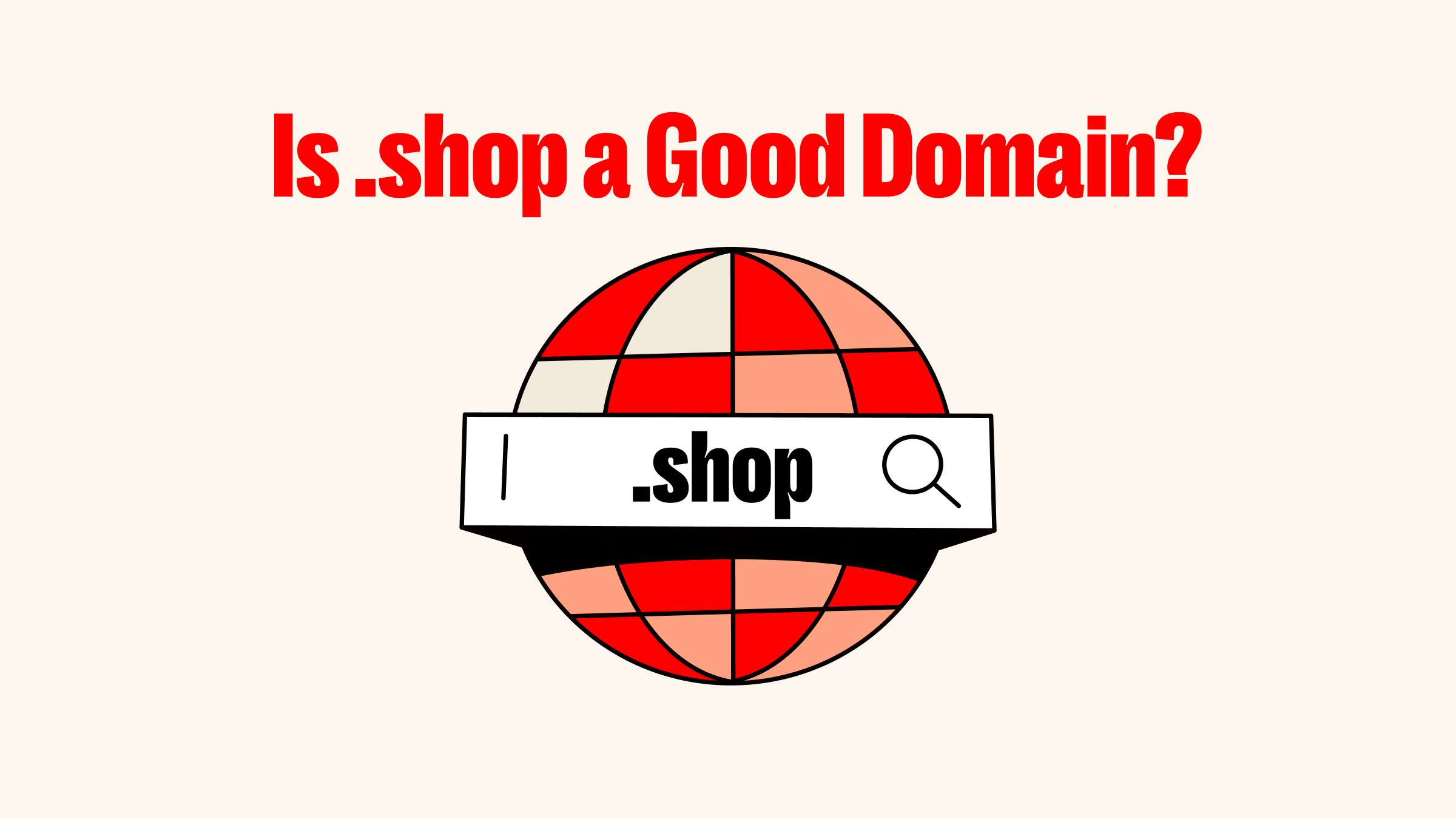
What is a store domain?
Store domain names are online addresses that combine custom names and domain extensions to identify online businesses. These letters, numbers, and punctuations appear in search boxes when customers want to find your store online. In more complex terms, they are associated with long numeric strings that identify a network domain or the Internet Protocol (IP) source used to access parts of the internet.
According to the user Diogeneselcinico42 in the subreddit r/explainlikeimfive on the popular internet forum Reddit, "The main purpose of domain names on the Internet, and the Domain Name System (DNS), is to translate the IP addresses of every asset on the network into memorable, easy-to-find terms." A store domain is part of that system.
New domain extensions
Registered domain names consist of a custom name and a domain extension. As of 2021, data shared by CircleID show that .com is the most registered domain (no surprise there) at 151.8M. The extensions .tk and .cn follow at 24.7M each. Somewhat surprisingly, the German domain extension .de has a lead at 16.7M over other extensions denoting regional affiliation, including ".uk" (9.5M) for the United Kingdom, ".nl" (6.1M) for the Netherlands, ".ru" (5.7M) for Russia, and ".br" (4.5M) for Brazil. The two legacy extensions, ".net" (13.4M) and ".org" (10.3M) are holding on against the incursion of new domain extensions, but just barely.
European domains
Europeans love their nationality-based extensions for historical-cultural reasons. But new extensions have also been introduced in large numbers in recent years due to the difficulty of finding concise domain names that are still available (this is not just a store domain problem!).
Out of the new domain extensions, top performers include ".xyz" and ".icu", both at 2.3M, and also ".online" (1.2M), ".top" (1.1M), ".site" (1M). Just outside of the top 5, there's also ".club" which experienced 216% growth in the past year. A store domain with an extension that signals European origins may alleviate privacy protection concerns for certain customers. It's no secret that European countries are leaders in the privacy protection space.
Do I need a store domain for my business?
While a unique store domain isn't absolutely necessary, meaning you can have an online store without a dedicated domain name, having a memorable domain certainly will certainly help your online store appeal to potential customers.
For instance, can you think of an established brand that uses a domain name that has nothing to do with its company name? While it's possible that there are businesses out there that fit this profile, you're having trouble thinking of one because domains that are unrelated to the businesses that they identify are just not good branding.
Would you trust a website without a unique domain?
Let's look at this question from another perspective. Would you feel comfortable entering your personal payment information into the checkout page of an online store with the URL "www.shopwikbannm.com"? That's clearly not a trustworthy store domain. Wouldn't you be more comfortable shopping at an online store with the URL "www.quickfind.com"?
The fact is that a website with a legible, unique, and relevant domain name is the natural choice for online shoppers. The perfect domain name will give small businesses an instant credibility boost. So when you're thinking about whether you should spend a bit extra and spring for a new domain name that makes sense for your business, don't hesitate, just do it!
If you're still not convinced, let's look at a few more reasons why paying extra for a domain name makes sense.
Better keyword opportunities
Assuming you're new to eCommerce, you should know that the most valuable thing for an online store is visitors and that the most valuable source of online visitors is organic traffic from online search engines. Online search services are familiar to the overwhelming majority of internet users, but their underlying logic remains largely a mystery to most. To keep a long story short, online search engines "crawl" (almost) all the websites and their pages on the internet with "bots" in order to index them for people that are looking for particular bits of information.
Most commercial websites practice Search Engine Optimization (SEO) to make their content stand out from competing content so that they rank at the top of Search Engine Result Pages (SERP). It's interesting to note that most people pay attention to the first and last search results on a SERP, which means that if your online store appears in either of those places on the first page for relevant keywords, then you'll be getting a significant amount of traffic to your store from search services, free of charge. For more, read our SEO FAQs.

Now, if your website URL or domain name is completely unrelated to your industry or, worse, if it's a generic domain that's indistinguishable from the sea of free websites on the internet, then there's very little chance that someone searching for products that your online store carries will ever see your website in the top search results of any online searches.
On a related note, some people will argue that a ".com" domain is preferable to a ".net" or ".store" domain in terms of ranking for relevant results in online search services; there is evidence to refute that claim. There's an increasingly large selection of store domain extensions that you can pick from, choose wisely.
Better user perception
The marketing guru Al Ries once said that "When it comes to building brands, perception is more important than reality." While arguments exist for having a generic top-level domain name, more visitors will trust an identifiable and memorable domain because it's consistent with what they know. Familiarity is good when it comes to online sales. If you're offering products or services online, it's imperative for your business to look like it belongs there. And the best way to do that is to have a domain name that's different, but not too different, from the other store domains.
Certain online stores offer the same or better products for the same or better price than the established brand in that particular space. Yet an experienced customer is willing to pay a premium to purchase that product from the better-known shop, even if the product being offered is the exact same! This is a perception problem, not a product problem.
The perception is that, while your online store could be a great choice, it just isn't as trustworthy as an online store with a store domain extension that's been etched into the minds of your potential customer. Your job is, then, to create a perception of your store domain that lends credibility to the service or product that your company is offering, despite being a relatively new eCommerce business. And having a unique top-level domain can certainly help.
How do I pick the right store domain?
Now that you're convinced about the need to have a store domain name that stands apart from other store domains. You need to perform a competitor analysis. Your objective is to detect a pattern in the way that your competitors have devised their store domains and then create a store domain name that's different, but not too different, from all the other store domain names in your niche.
When you're looking for a domain name, you'll often find that the perfect domain is already taken. You don't need to worry because, just like milk, a domain expires after a period of time. The holder of your dream domain could also sell it to you. You can head over to a domain registrar like GoDaddy to find out if the web address you want is open for registration. If you don't have a brand yet, you can use Shoplazza's own trademark tool to find out the availability of your ideal brand name, logo, and social media handles. Find out more here.
Brainstorming your store domain
When you're in the brainstorming stage, a good place to start is to create a combination of short words that capture your brand message or describe the service you provide to your customers. Don't rely on a support team for this part of your branding, as store domains can make or break online stores. An online business is not complete without a unique site.
You should also make sure that your store domain doesn't lend itself to misunderstandings in casual conversation. A great example of this is the "Hotmail" name. Younger readers may not be familiar with the popularity of Microsoft's Hotmail, but mostly everyone had an account once upon a time. And for that reason, there was once also a surge of searches for "Hot Males" in search engines by people looking for the email service, particularly from users with poor command of the English language and early adopters of auto-correct software.
So if you're thinking about whether you should register the genius store domain that you've come up with for your eCommerce store, give yourself a grace period before registering and looking for a hosting service.
Takeaways
If you're new to eCommerce and wondering whether you need a unique store domain, you can stop wondering. A relevant store domain with a store domain extension that's different but not too different from established brands in your niche will make all the difference in the world to potential customers. You will also rank better against other domains when your business website has a name you can legally register with hosting services.
Building a brand and business takes lots of work, secure your investment against potential infractions by registering your store domain. Don't be cheap with your store domain extension either, the price of the perfect store domain is more affordable than you think. You'll know it was all worth it when you see your domain name at the top of search engine result pages!


